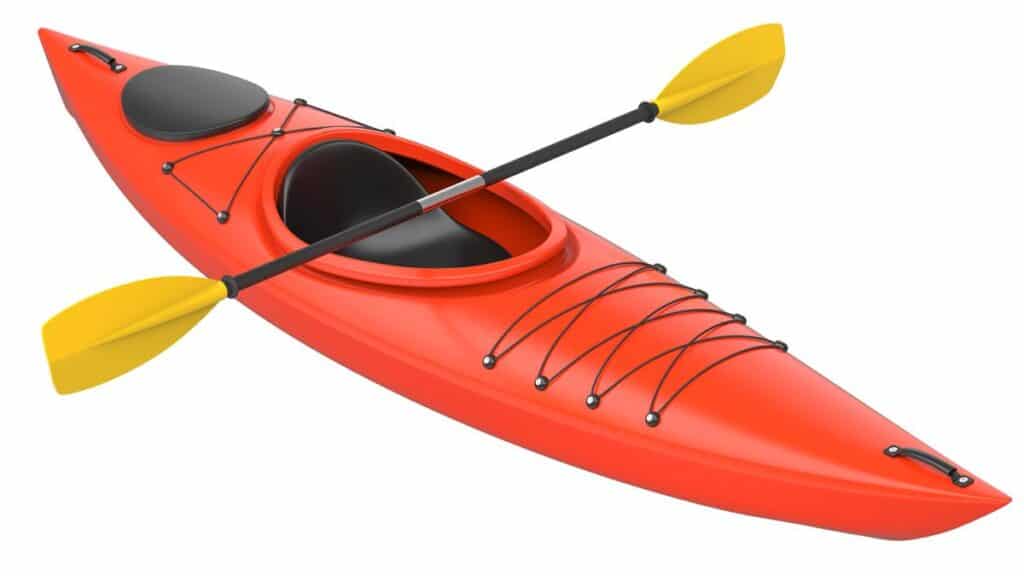Today, we’re tackling an often-underestimated yet essential subject: the weight of a kayak. Whether you’re a kayaking newbie or a seasoned paddler, understanding the weight of your vessel is crucial for several reasons, such as transportation, storage, and most importantly, your overall experience on the water.
Short Answer : So how much do kayaks weigh?
The average weight of a single person kayak is usually, around 35 pounds ( 16 kilograms). If you’re kayaking with a partner in a tandem kayak you can expect the weight to increase to 65 pounds (or around 27 kilograms). Fishing kayaks, equipped with gear and features can weigh over 120 pounds ( to 54 kilograms). Generally the weight range for kayaks varies from as as 20 pounds (about 9 kilograms) to well, over 100 pounds (approximately 45 kilograms).
Why Does Kayak Weight Matter?
To answer this question, let’s start with a simple observation. If you’ve ever had the experience of moving a kayak from your garage to a waterway, you know that a lighter option can simplify your life immensely. But it’s not only about convenience. The weight of your kayak can significantly affect its performance in the water, influencing its speed, stability, and ability to handle varying conditions.
Factors Influencing Kayak Weight
One key factor that determines a kayak’s weight is the material used in its construction. Here’s a quick rundown:
Polyethylene
This commonly used material tends to make for heavier kayaks, typically ranging between 40 to 80 pounds.

Different Types and Their Respective Weights
Different styles of kayaks have different weight ranges due to the materials used and their intended function.
Composite Kayaks
Crafted from lightweight materials like fiberglass or carbon fiber, these kayaks generally weigh between 35 to 65 pounds.
Inflatable Kayaks
These are usually the lightest option, tipping the scales at around 20 to 40 pounds. However, they may not offer performance levels comparable to hardshell kayaks.
Design and Length Considerations
- Recreational Kayaks: These tend to be shorter and can weigh as little as 35 pounds.
- Sea Kayaks: With their streamlined designs, sea kayaks can weigh up to 70 pounds or more, especially when additional equipment and storage compartments are factored in.
- Fishing Kayaks: Designed with special accessories like rod holders and trolling motors, these kayaks can weigh anywhere from 70 to 120 pounds.

Don’t Overlook Gear Weight
Remember, additional gear like paddles, life vests, and fishing equipment can add to the overall weight you’ll need to manage.
How to Accurately Determine Your Kayak’s Weight
- Check Manufacturer Specifications: Most brands provide weight details for their products.
- Use a Scale: For a precise measure, place your kayak on a scale.
- Manual Estimation: If a scale is unavailable, try lifting one end of the kayak and comparing it to an object whose weight you know. While not exact, it can give you a ballpark figure.
Implications of Weight
Portability
If you enjoy kayaking at multiple locations, it’s crucial to opt for a kayak that’s easily transportable. Consider the lifting involved, both onto your vehicle and down to the water.
Performance
Lighter kayaks tend to be faster but may compromise on stability. Heavier kayaks are generally more stable but may be slower and less agile.
Storage
The kayak’s weight can also impact your storage solutions. Hanging systems and overhead pulleys might have specific weight limitations, so be mindful of that.
Tips, for Managing Its Weight
- Utilize a Kayak Cart: These incredible two wheeled devices are designed to transport your kayak.
- Team Up: It’s always an idea to have the assistance of a friend or family member when lifting and moving the kayak safely.
- Balance the Load: If your kayak comes with storage compartments make sure to distribute the weight. This will make handling the kayak much easier both on and off the water.
Final Thoughts
Understanding the weight of your kayak is crucial as it significantly impacts your kayaking experience from loading it onto your vehicle to navigating through the waters. When selecting a kayak consider how you plan to use it and choose a model that suits your needs and lifestyle.

